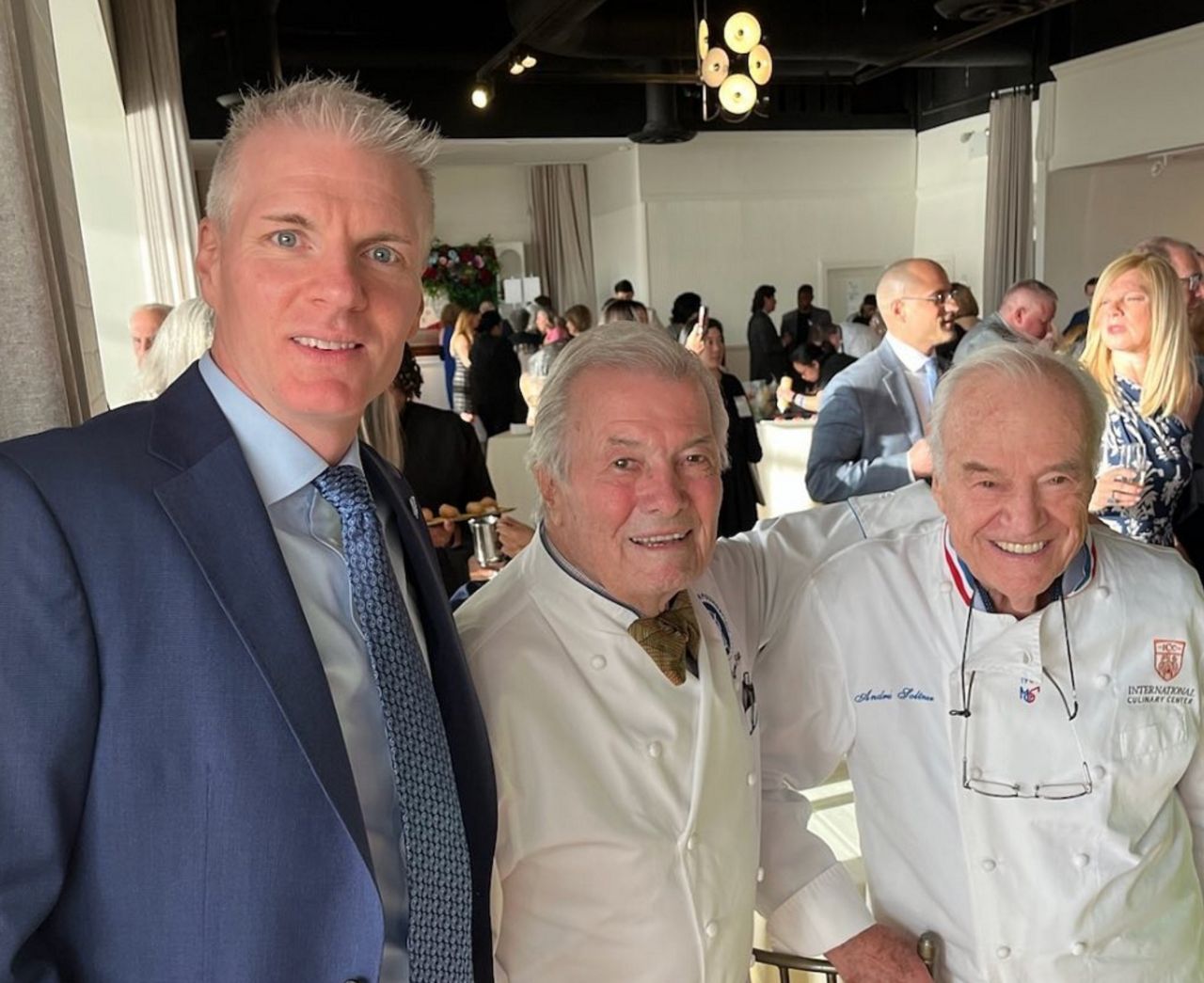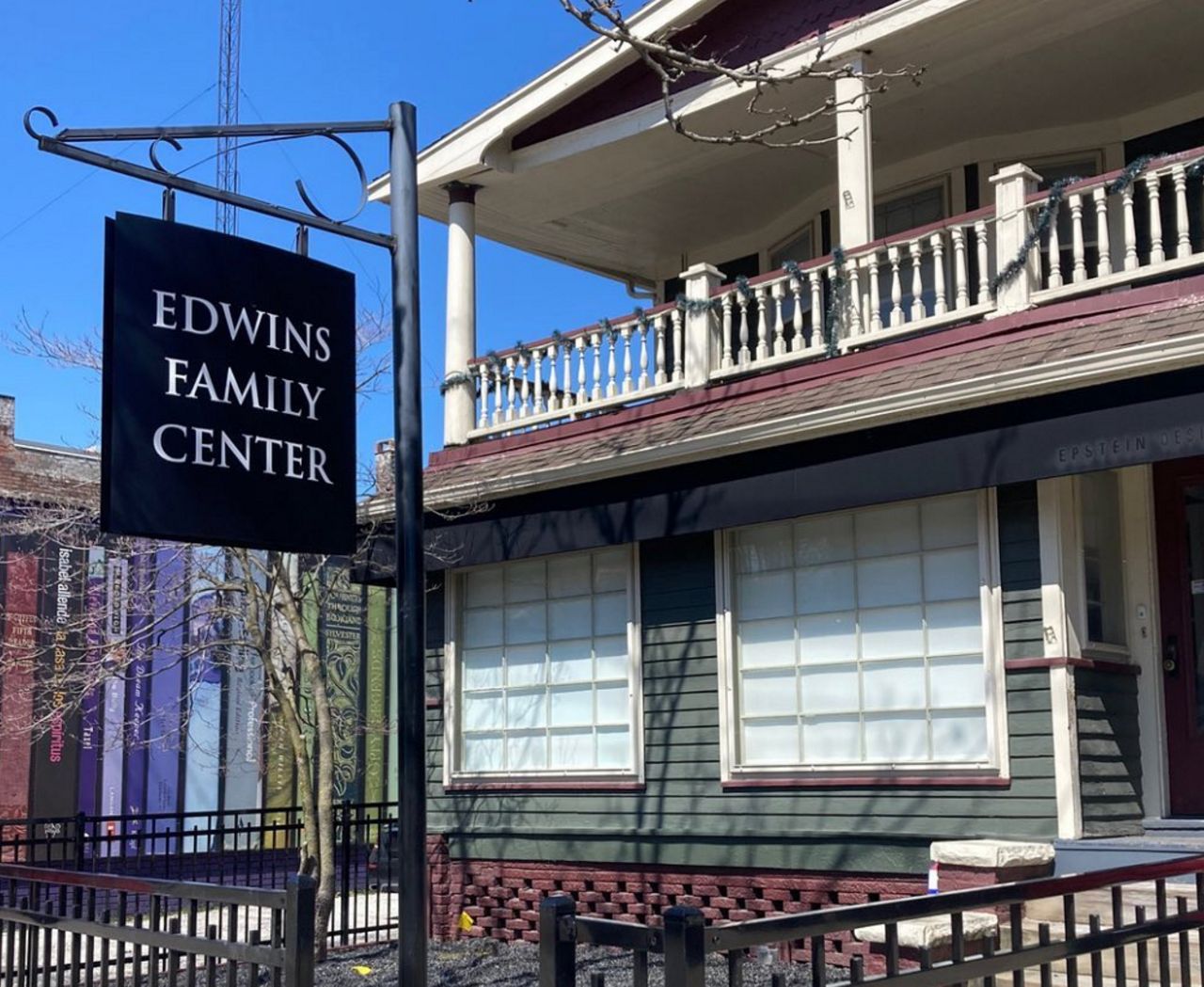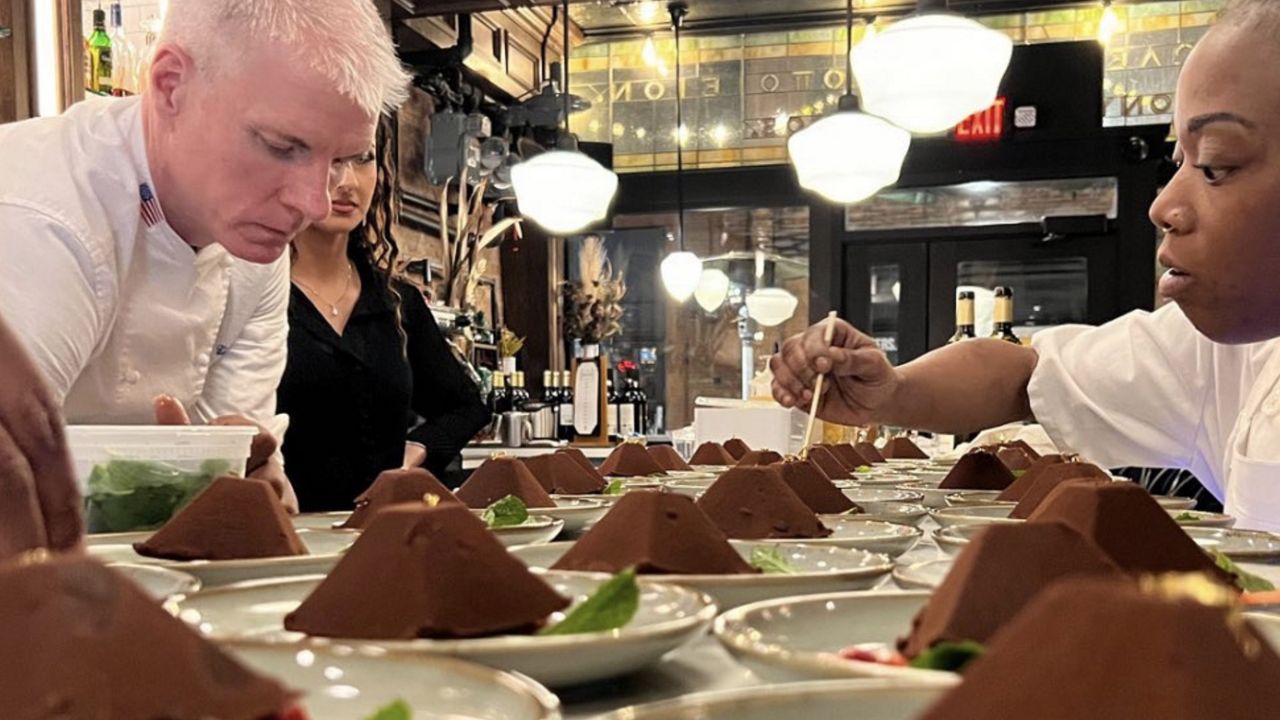SHAKER HEIGHTS, Ohio — Carissa “Lucky” Smith stands busily in the corner preparing her station for the night’s dinner service at EDWINS, a bistro in a picturesque part of Shaker Square.
The evening’s menu reads like an encyclopedia entry on classic French dishes such as frog legs, steak tartare, seared Hudson Valley foie gras and Burgundy snails with caramelized fennel and garlic butter.
Smith carefully sharpens her knives and tidies her station, setting up her mise en place — a culinary phrase that means “putting in place” — just the way she likes them to ensure she’s ready for the controlled chaos that is the dinner rush.
It’s a similar setup to what you’d see if you walked into any of the finest restaurants around the world.
“It’s a lot of pressure, but it’s a good pressure,” said Smith, 33.
The pressure Smith is hinting at isn’t about pleasing guests and avoiding bad Yelp reviews. She doesn’t want that to happen, of course, but what she’s feeling is much greater than that, she said.
For Smith, a convicted felon, every meal she creates brings her a step closer to building a life and a career she never thought possible.
What You Need To Know
- EDWINS offers six-month trainings to former inmates who've had a difficult time getting job training and meaningful employment since their release
- More than 500 people have gone through the program in the past decade
- The restaurant's owner, Brandon Chrostowski, started the program after his own legal battles
Smith is one of 47 students enrolled at EDWINS Leadership and Restaurant Institute, a Cleveland-based nonprofit that offers formerly incarcerated adults a foundation in the culinary and hospitality industries.
They get access to social services through the program. Just as important, they receive a regular paycheck, and can pick up extra shifts at the sister restaurant, edwins too, if they want a little extra cash.
After six months of training, Smith and the other members of her cohort are graduating on Saturday, May 6.
“It’s the best feeling,” Smith said. “Nobody is judging you because of your past. In the kitchen, you get judged based on your work ethic and your initiative. I don’t have to explain myself to anyone. I just let my work speak for itself.”
Giving people something to fight for
Chef Brandon Chrostowski started the nonprofit in 2011 by giving culinary classes at Grafton Correctional Institution in Lorain County. He opened EDWINS Restaurant opened on Nov. 1, 2013. Since, the organization has added the second restaurant, a butcher shop and a bakery.
While enrolled at EDWINS, students go through intensive, hands-on training. They start as servers, bartenders and other front-of-house positions, before moving into the kitchen.
There have been 548 people who’ve graduated from the program in the past decade.
“It’s about hope,” Chrostowski said. “We want to bring some hope while people are in a dark place by giving them a realistic goal and showing that them that can find success in life.”

For his work, James Beard Foundation has named Chrostowski a finalist for national Outstanding Restaurateur of 2023. He plans to bring at least 15 to 20 of his current and former students to the awards banquet in Chicago this June.
The nomination is validation of his team’s decade of hard work, Chrostowski said. But he stressed it has the potential ability to shine a brighter spotlight on the issue of reentry.
Reentry is a term that describes the process of a person transitioning from prison back into everyday life. One of the biggest issues for those facing reentry is finding a job.
Individuals with criminal records face substantial challenges in the labor market. A 2008 study by the Prison Policy Initiative estimated that the unemployment rate for formerly incarcerated person (FIPs) in that year was about 27%, compared to just over 5% for the population overall.
Chrostowski understands the struggles Smith went through firsthand. When he was 18, the Detroit native was charged with resisting arrest after originally being suspected of a drug-related offense. Chrostowski referred to that situation as the “tip of the iceberg.”
A judge could have imposed a lengthy prison term. Instead, though, he got a year of probation.
“I was in despair,” Chrostowski said. “I was in and out of jails and I was in a position where I didn’t know what I was hanging on for.”
After his legal ordeal, Chrostowski started working with chef George Kalergis, who became his mentor. That relationship led to Chrostowski attending The Culinary Institute of America in New York City. From there, he’s gone to working in Paris and other major food cities.
“I’m so grateful that someone took a chance and really gave me something fulfilling worth fighting for,” he added.
Overcoming barriers to reentry
One of the major barriers of successful reentry is the skill and knowledge gap they may have developed after being incarcerated two, three years or longer, said Trina Jackson, the director of the Office of Reentry for Hamilton County in southwest Ohio.
Jackson noted in-prison education and job training opportunities have improved somewhat in recent years, but there’s still a challenge.
Smith, for example, didn’t graduate from high school, and she didn’t have a formal middle-school education either, she said. Prior to serving time as an adult, Smith spent five years in a juvenile detention facility.

While some jobs and education programs existed for inmates, Smith said she felt like she was being set up to “do and be nothing” upon her release.
Data presented by the White House in May 2022 linked employment to the rate of recidivism.
“When you don’t feel you have an option, you go back to what you know. The streets were all I knew,” Smith said.
But even with skills and education, formerly imprisoned persons also face issues of discrimination, Jackson said. She believes a lot of employers aren’t willing to take the chance on someone with a criminal background.
Jackson referred to going to a prison as a “never-ending sentence” for many returning residents.
That was the case for Jiri Wilson, 28. He spent a year behind bars at 19. Wilson didn’t want to discuss the specific of his crimes, but he said they were fourth- and fifth-degree felonies.
Even though his conviction happened nearly a decade ago, Wilson has had trouble finding a gainful employment. Prior to enrolling at EDWINS, he was working in janitorial maintenance. But he lost that job after his boss found out about his felony conviction, he said.
“I got really down on myself,” said Wilson, whose mother died from ovarian cancer in 2015, two weeks before his release from prison.
“It felt like I was on my own,” he added. “I didn’t know what to do with my life. I really had no direction.”
When he found out about EDWINS, he set up an interview and took a bus to Akron that same day.
“They didn’t ask about my background; they didn’t ask to have a background check or anything,” he said. “They asked why I wanted to join the program, and then accepted me with open hands.”
Having an employer who understands the complexity of reentering can be important, said Jackson, whose office works employers in southwest Ohio. Not only are they potentially more likely to give a person a chance, but they also understand the process that person is going through to re-acclimate themselves to day-to-day life.
EDWINS has a 95% employment rate among its graduates. Less than 1% of its students return to prison, per data from the program.
Wilson said he looks at Chrostowski as motivation.
“If he can do it, I can do it,” she said.
Giving people hope through cooking
Both Smith and Wilson developed their love of cooking from their mothers. Smith’s family is from New Orleans, so she loves to use Creole flavors, she said.
Wilson, on the other hand, prefers the traditional French techniques. He’s a big fan of sauce work and making desserts and pastries. Through his work on several community events, he’s developed a love of Polish cuisine as well.
The classes at EDWINS are “very long,” Wilson said with a muffled chuckle. He said staff goes over everything step-by-step.
“Even if you might not be successful at first, they take their time with you and they teach you how to be successful,” Wilson added. “They won’t let you fail.”
EDWINS takes a similar you-will-not-fail approach outside the classroom, Chrostowski said. The program has rules students must follow, but they don’t want to turn anyone away. Two of the biggest challenges those reentering face are issues related to housing or transportation, Jackson said.

Smith was homeless and bouncing around Cleveland before she started the program.
The EDWINS campus has dormitories for students, so they have somewhere to sleep and study while they’re in the course. They also have a team or family meal — a common tradition in many restaurants — around 3:30 p.m. every day ahead of that evening’s dinner service.
The nonprofit also provides legal services, basic medical care, clothing, job coaching, literacy programs at its Second Chance Life Skills Center. EDWINS is going to offer free child care for its students once its family center opens later this month.
After graduation, some EDWINS alums stick around to work as instructors or take managerial training. But most end up working in kitchens, bars or resorts across the country.
Smith said she’d also like to work on a cruise ship. She’s never really traveled much and that would allow her to see “some of the most beautiful places.”
“Before, I never thought I could have a job like this. But now I feel like I can go anywhere and do anything,” she said. “Having hope is the most beautiful thing.”





